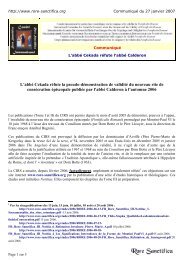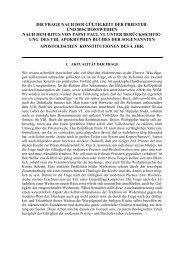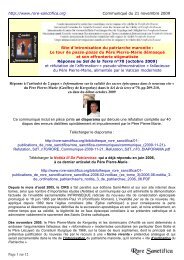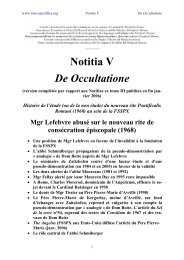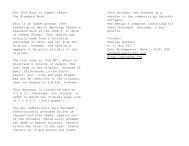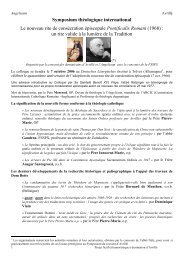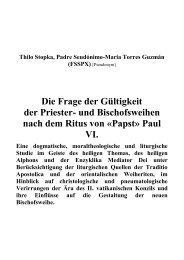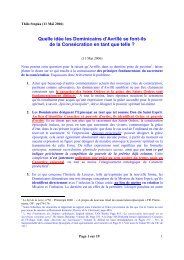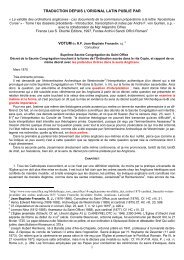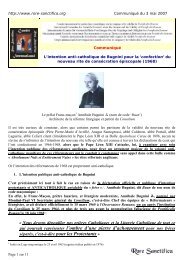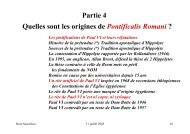THE ORDER OF MELCHISEDECH A Defence of ... - Rore Sanctifica
THE ORDER OF MELCHISEDECH A Defence of ... - Rore Sanctifica
THE ORDER OF MELCHISEDECH A Defence of ... - Rore Sanctifica
You also want an ePaper? Increase the reach of your titles
YUMPU automatically turns print PDFs into web optimized ePapers that Google loves.
exclusive term for anyone responsible for an ecclesial service-----ought really to be dispensed with;<br />
as far as the New Testament is concerned, all believers are 'priests', 'clerics', or 'ecclesiastics'." 8 He<br />
insists that ordination cannot be termed a Sacrament in the proper sense <strong>of</strong> the term: "If 'institution<br />
by Christ' has to derive from the New Testament, then ordination cannot be called a sacrament." 9<br />
These views are condemned by Canons I and III.<br />
Küng would like to see the term "priesthood" replaced by terms that "describe functions". 10 Time<br />
and again he makes explicit his belief that contrary to Trent (Canon I), and in accord with the<br />
Protestant Reformers, ordination does not impart powers which distinguish the priest not simply in<br />
degree but in essence from the layman, but that the priesthood is "only an <strong>of</strong>fice". Therefore the<br />
term "priest" must be dropped in favour <strong>of</strong> "terms that describe functions . . . If a more general term<br />
is needed that can be used for all these functions, 'service <strong>of</strong> leadership' or 'presidency' would seem<br />
appropriate (one might speak <strong>of</strong> the person 'responsible for' or the 'president <strong>of</strong>, a parish, diocese or<br />
local or national church, and so on)." 11<br />
Küng is not opposed to a service <strong>of</strong> ordination as long as it is seen simply as an appropriate sign by<br />
which the community acknowledges that a particular individual has received a call from God to<br />
exercise an <strong>of</strong>fice which is not necessarily permanent. 12 Ordination must not be regarded as the<br />
only "means <strong>of</strong> access to the services <strong>of</strong> leadership". 13 The ecclesial ministry can be a sole<br />
pr<strong>of</strong>ession or second occupation, it can be undertaken for life or for a short period, it is open to men<br />
or women, married or unmarried. 14 It is an appropriate sign <strong>of</strong> continuity with "the apostolic;<br />
succession", but "the apostolic succession is primarily a succession to the faith and creed <strong>of</strong> the<br />
apostles, and to apostolic service and life." 15 There is "no question <strong>of</strong> tracing things back to 'divine<br />
institution' or to 'institution by Jesus Christ'." 16 (See Canons III & VI.) He claims that there are<br />
other modes <strong>of</strong> entering the apostolic succession apart from ordination, a theory examined in detail<br />
in Appendix IV. This makes possible valid celebrations <strong>of</strong> the Eucharist where no priest is available<br />
and the "recognition <strong>of</strong> the validity <strong>of</strong> ministries and sacraments in a Church whose presidents do<br />
not historically enjoy the special 'apostolic succession'." 17<br />
Not only is Küng's "president" simply the holder <strong>of</strong> an <strong>of</strong>fice 'but it is an <strong>of</strong>fice primarily (or solely)<br />
concerned with preaching' (see Canon I). Even celebrating the Eucharist can be interpreted as no<br />
more than an extension <strong>of</strong> preaching the word:<br />
In preaching in all its diverse forms, the president <strong>of</strong> the community serves the Church which is,<br />
despite all differences, and by virtue <strong>of</strong> the word, a community <strong>of</strong> faith and the pr<strong>of</strong>ession <strong>of</strong> that<br />
faith. His preaching is decisive in the orientation <strong>of</strong> the Church; he prompts and he suggests. In the<br />
most various situations he returns to the major questions: where do man and the world come from?<br />
where are they going? why? and to what purpose? Perhaps he will pose the true questions more<br />
<strong>of</strong>ten than he will supply all the answers. He addreSses the community in this way, searching<br />
among those who are in search <strong>of</strong> something; a fisher among fishers. 18<br />
Küng is adamant that "the ecclesial ministry should not be exclusively masculine: it should not be<br />
an all-male league." 19 However, not everyone could perform the <strong>of</strong>fice <strong>of</strong> "president". Certain<br />
qualifications are necessary, among which "experience <strong>of</strong> group management" figures prominently.<br />
Evidently this is not an obvious task that just anyone could fulfill. One has to have the right gifts<br />
and aptitudes for the job; one has to have experience <strong>of</strong> group management and coordination; a<br />
certain training, even if a scientific training (though very <strong>of</strong>ten useful) is not indispensable. 20<br />
In order to make more specific the type <strong>of</strong> person he envisages as the ideal community leader Küng<br />
states that "for detailed individual models we have to go to actual servants <strong>of</strong> the Church . . . John F.<br />
Kennedy, Martin Luther King, Dag Hammarskjöld-----all three convinced Christians who are still<br />
living charismatic examples, precisely because they were assassinated while carrying out their<br />
service." 21



